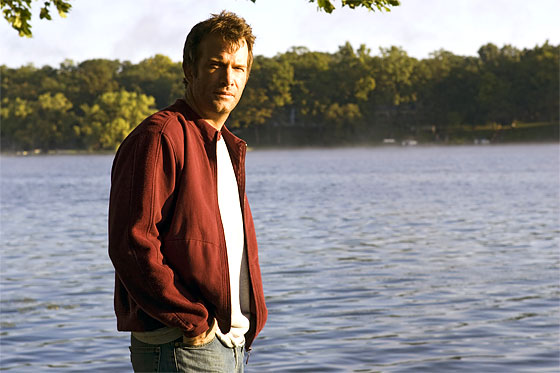
Oy, what a disappointment. I had high hopes for Hung, with its HBO imprimatur and naughty premise: Large-cocked loser finds his smile by marketing what’s in his pants. Basically, the series promised something like Boogie Nights without the porn, plus all the guilty-pleasure satisfactions of Sex and the City and early Entourage — smart dialogue, funny-dark graphic sex scenes, and the excuse to say “large-cocked loser” while discussing the show with friends.
But sadly, there’s no motion to this ocean. For one thing, it’s hard to avoid the fact that Boogie Nights really makes no sense if it’s not set in the actual porn industry, i.e. a man with a monstrous endowment is not really all THAT marketable to your average straight woman — especially in recession-era Detroit, and particularly when he’s a charmless, embittered, divorced middle-aged gym coach, and one not notably skilled in bed, judging from the show’s funny-dark graphic sex scenes. (Also, there’s no mention on the show that sex with decently endowed bitter middle-aged men is available for free, any time of day, on Craigslist.)
Part of the problem is that Thomas Jane, so appealing in other roles and theoretically a physically attractive man, is peculiarly off-putting as Ray Drecker. The character stinks of defeat; he’s an ex-jock, self-admittedly not too smart, and he sulks around the high school where he coaches gym brooding over just about everything — his ex-wife and her new husband, his job prospects, his miserable teenage twins, the house that burned down and that he can’t rebuild because he was too flaky to send in the insurance payment. (We learn all this in voice-over, a lazy go-to device used better on Showtime’s Diary of a Call Girl.) To Ray, everyone is a “fucker” — which might be acceptable, except that the show validates this lazy contempt: Like About Schmidt (also directed by Alexander Payne), it’s stuffed with misanthropic sketches of self-help seminars and yuppie dermatologists. Basically, Ray’s Rabbit Angstrom, except he’s not all that observant.
There’s one bright spot here: Jane Adams, playing Tanya, a barely employed poet who suffers from what Ray describes irascibly as “veganism and the yakking and the coming that had no beginning and no end.” A crunchy proto-feminist, Tanya is somehow at once acerbic and pathetic, and she has a real comic chemistry with her fellow sad sack, even before she decides to pimp him out. Tanya and Ray have several bouts of terrible sex (at least from his perspective), but she’s the one who designs the marketing scheme, which is to brand Ray as a “Happiness Consultant.” Anne Heche is there too, doing a decent Teri Garr imitation as Ray’s wife, a shallow nitwit the show struggles to make layered and succeeds only in making incoherent. Ray’s twin teenagers are more interesting, two puffy brooders with good reason to loathe their parents, but it’s not enough — the emotional engine never kicks in; the comedy stalls.
Now, this is HBO: There’s some smart dialogue here and a few pleasantly goofy riffs on Tanya’s own idea for a business (pastry stuffed with poetry, like “a croissant folded around Maya Angelou’s ‘Phenomenal Woman’”). It’s not impossible that the show might improve in time, becoming, as it seems intended to be, a sitcom riff on Susan Faludi’s Stiffed, a perverse fable about the way a man emasculated by the bad economy learns to strut again. But to do that, it would have to have a grander, more thoughtful, more empathic vision of the world around Ray. Right now, it just doesn’t go deep enough.

